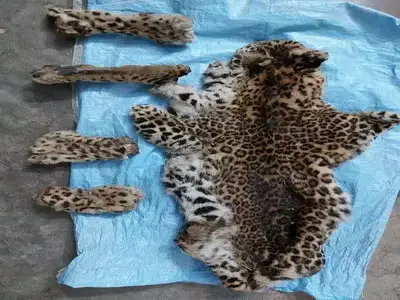10 arrested for hunting leopard in Salekasa, cutting claws
This raid is a sequel to the previous arrests of poachers, Bones and body parts of some leopards and tigers have been confiscated from the poachers.
Nagpur: Leopard and tiger skins and their body parts have been rained in this area and In conducting another raid on the hunters, The officials of the Nagpur Forest Department have arrested around 10 accused from Saleksa, Forest Division of Gondia on the charges of poaching 1 leopard and removing the leopard claws and other parts of the leopard’s body.

This raid is very much a sequel to the previous arrests of poachers, Bones and body parts of some leopards and tigers have been confiscated from the poachers. And the Assistant Conservator of Forests (ACF) and Inquiry Officer whose name is Narendra Chandewar. According to him, since the month of July, the number of accused arrested in wildlife crime has gone up to 73.
Acting on a tip-off, Narendra has said that a joint team of forest officials from district Nagpur and Gondia lured poachers into the playground of a junior college in Salekasa. And the team has also seized a leopard skin, mustache, canines, teeth, 4 severed claws. And 3 motorcycles used to smuggle goods have also been seized.
Accused Tried To Mislead
The accused have been identified as Vinod Daseriya, Kawrabandh, Litesh Kumbhre, Mokara, Dinesh Sahare, Deori, Radheshyam Uikey, Jallatola, Jogeshwar Daseriya, Dhansowa (Bori), Ramkrishna Dahale, Pandhri, Pappu Madavi, Jambhli, Dinesh Shrivastav, Bhandara, Sandeep Ramteke, Baghnadi (Chhattisgarh) and Parasram Meshram, Girola.
Narendra has also said that the accused have tried to mislead by saying that they did not kill the leopard. Rather, in July 2021, a leopard was found dead near a hill in Saleksa. But the animal was poached and then later the body parts of this animal were removed. These accused were looking for potential customers for the last 4 months.
On the date of 24 November, 1 team of forest officials of Nagpur had caught 5 people on the charge of hunting 1 tiger, and then its body parts were also confiscated. In both these cases, Melghat Cyber Cell has proved to be very helpful in apprehending the culprits.
Also Read: New coronavirus cases are coming from Chanda, Yavatmal





